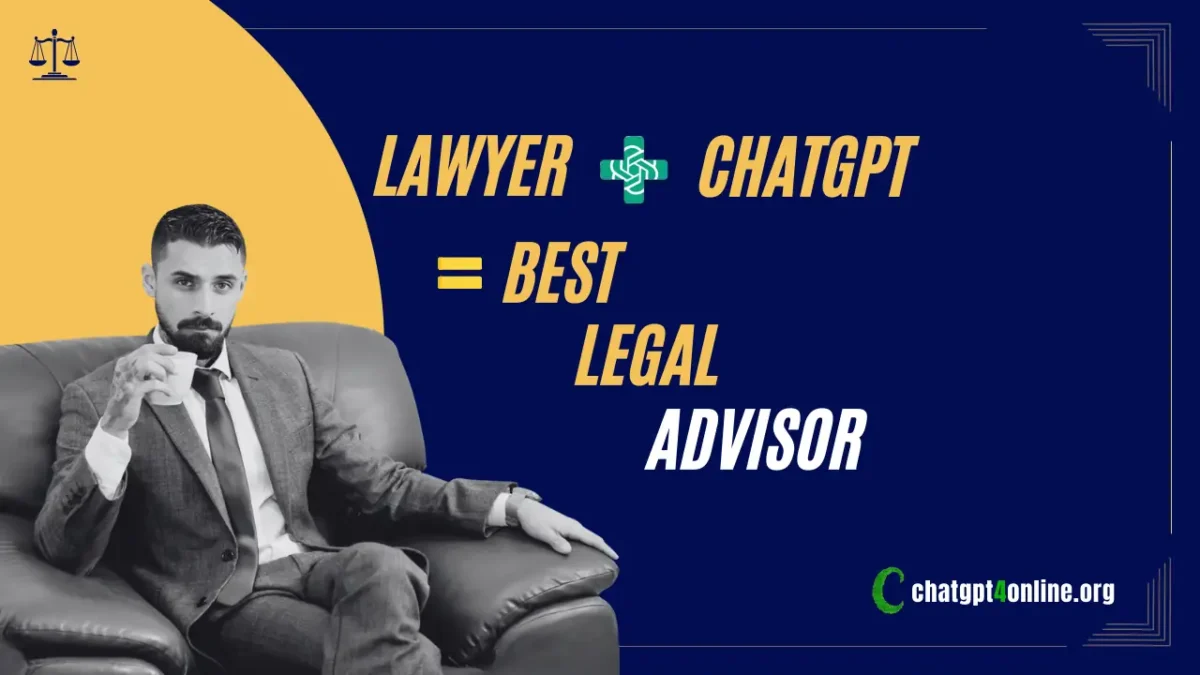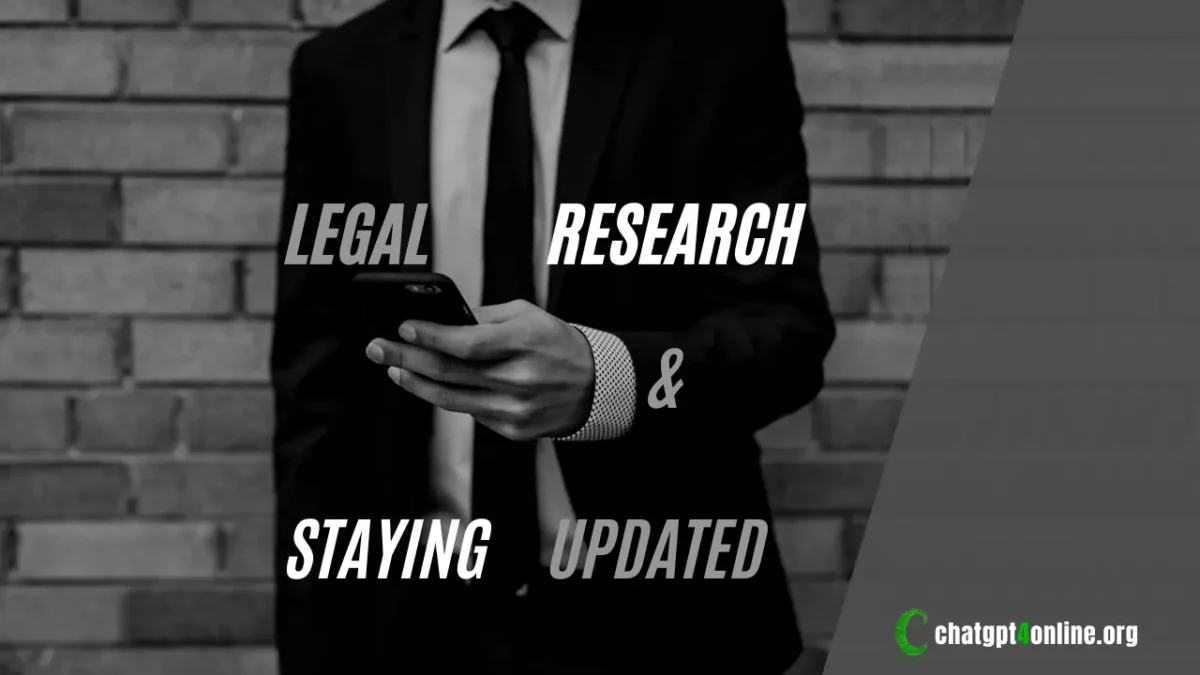ChatGPT for Lawyers: How can Lawyer use ChatGPT effectively
In today’s fast-paced world, the legal profession is constantly evolving, and technology is playing a crucial role in shaping its future. One such technological innovation that has gained significant attraction is ChatGPT, an advanced AI language model developed by OpenAI.
Designed to understand and generate human-like text, ChatGPT can assist with various tasks, making it a valuable tool for legal professionals. From conducting research to drafting documents, ChatGPT for lawyers offers a range of applications that can enhance efficiency and productivity in legal practice.
My introduction to ChatGPT in the legal field came through a close friend, an experienced lawyer based in New York. Over numerous coffee chats and late-night brainstorming sessions, he shared his insights and experiences on integrating this AI tool into his daily workflow.
His practical knowledge and firsthand accounts have provided me with a unique perspective on how lawyers can leverage ChatGPT effectively for their professional tasks.

I’ll share the strategies and examples he shared, illustrating the transformative impact ChatGPT can have on legal practice. Whether you’re a seasoned attorney or a law student, this article will offer valuable insights into utilizing the power of ChatGPT to streamline your work and improve your legal services.
5 Ways To Use ChatGPT For Lawyers
This guide will cover the following aspects of the usage of ChatGPT for Lawyers along with the first-hand experience of a lawyer:
How To Use ChatGPT For Research And Case Preparation?
The significant usage of ChatGPT for lawyers is to use it for research and case preparation. We’ll see here how ChatGPT serves as a powerful tool to enhance research efficiency and clarity, enabling lawyers to focus on more strategic aspects of their cases.
Gathering Information
One of the most time-consuming aspects of legal work is gathering information for case preparation. Whether it’s understanding the intricacies of a new case or delving into precedents and statutes, the initial research phase is highly significant. This is where ChatGPT can be a game-changer for lawyers.
Suppose you’re tasked with a case involving a niche area of law that you haven’t explored deeply before. Instead of spending hours sifting through countless legal databases and journals, you can use ChatGPT to get a head start.
For instance, you might input a query like, “What are the key legal principles in New York related to cyberbullying?” ChatGPT can provide a concise summary of the relevant laws, highlight key cases, and point out significant statutes.
My friend, who’s a lawyer, often uses ChatGPT to conduct initial research. He mentioned a case where he needed to understand the legal ramifications of cryptocurrency transactions. By querying ChatGPT, he quickly gathered a foundational understanding of how cryptocurrencies are regulated in New York, including relevant case laws and statutory provisions. This allowed him to focus his efforts on more detailed research, saving him valuable time.
Summarizing Legal Documents
Legal documents are notorious for their complexity and length. Whether it’s a lengthy contract, a detailed court opinion, or a dense statutory provision, summarizing these documents into more digestible formats can be a daunting task. ChatGPT excels at simplifying complex legal texts, making them easier to understand and work with.
For example, if you receive a 50-page court opinion that you need to review for your case, you can use ChatGPT to generate a concise summary of the key points, arguments, and rulings. This not only helps in understanding the document quickly but also aids in identifying the most relevant sections that require further attention.
My lawyer friend recounted an instance where he was dealing with a particularly complicated contract filled with legal jargon and extensive clauses. By feeding the document into GPT-4o, he was able to produce a clear and concise summary, highlighting the main obligations, rights, and potential pitfalls.
This summary proved invaluable during client meetings, as it allowed him to explain the contract in straightforward terms, ensuring his clients were well-informed and confident in their decisions.
How To Use ChatGPT For Drafting Legal Documents?
ChatGPT can prove to be an invaluable tool for legal professionals, aiding in the creation of well-structured, clear, and precise legal documents. This allows lawyers to deliver high-quality work efficiently, ultimately benefiting their clients and their practice.
Initial Drafts And Templates
Drafting legal documents is a fundamental task for any lawyer, but it can be time-consuming and labor-intensive. This is where ChatGPT can provide substantial assistance, particularly in creating initial drafts and templates for various legal documents.
For instance, when drafting a contract, agreement, or memo, a lawyer can use ChatGPT to generate a preliminary version. In case you need to draft a non-disclosure agreement (NDA) for a new client.
By inputting key details such as the parties involved, the scope of confidentiality, and the duration of the agreement, ChatGPT for lawyers can create an initial draft that includes standard clauses and language. This draft can then be tailored to meet the specific needs of the case, saving significant time and effort.
My friend shared an experience where he had to prepare multiple employment agreements for a startup. By using ChatGPT, he was able to generate a series of customized templates that covered various roles and responsibilities.
These templates included essential legal provisions and allowed him to quickly adapt each agreement to the specific terms discussed with his client. This not only streamlined the drafting process but also ensured consistency across all documents.
I believe this is exactly the wonder of AI tools like ChatGPT 4 Online that help lawyers save time by creating initial drafts for legal documents.
Proofreading And Refining
Once an initial draft is created, the next critical step is proofreading and refining the document to ensure it is clear, precise, and legally sound. ChatGPT can assist in enhancing the clarity and precision of legal documents by identifying potential ambiguities, suggesting improvements, and checking for consistency.
For example, after drafting a complex merger agreement, you can use ChatGPT to review the document for clarity and coherence. The AI can highlight areas where the language might be unclear or redundant, suggest alternative wording for better precision, and ensure that legal terms are used consistently throughout the document.
My friend, who’s my legal advisor as well, often uses ChatGPT for this purpose. He recounted a case where he drafted a lengthy commercial lease agreement. By running the document through ChatGPT, he received valuable feedback on sections that could be more clearly articulated and suggestions for improving the overall readability of the agreement.
This process not only enhanced the quality of the final document but also reduced the likelihood of misinterpretation or disputes arising from unclear language.
How To Use ChatGPT For Client Communication?
Lawyers use ChatGPT to enhance communication efficiency and clarity. This helps lawyers provide their clients with timely, accurate, and understandable information, which is crucial for maintaining trust and ensuring successful outcomes.
Email Correspondence
Effective communication is essential in the legal profession, and email correspondence is a primary mode of interaction with clients. Crafting clear and professional emails can be a meticulous task, especially when dealing with complex legal issues. ChatGPT for lawyers can assist in drafting emails that are both precise and easy to understand.
For example, suppose you need to update a client on the progress of their case, explaining recent developments and next steps. By providing ChatGPT with the key points you want to cover, it can help you draft an email that succinctly conveys the necessary information. This ensures that your communication is not only professional but also clear and comprehensive.
My legal professional friend often uses ChatGPT for this purpose. He shared an experience where he had to explain a complicated legal ruling to a client who had little legal background.
By using ChatGPT, he was able to draft an email that broke down the legal jargon into plain language, making it easier for the client to understand the implications of the ruling. This improved the client’s understanding and satisfaction, as they felt more informed and reassured.
Preparing Client Reports
Another critical aspect of client communication is preparing reports that summarize the status of their case and outline the next steps. These reports need to be detailed yet understandable, providing clients with a clear picture of where their case stands and what actions will be taken moving forward.
For instance, if you’re working on a complex litigation case, you can use ChatGPT to help draft a report that summarizes recent court filings, key developments, and upcoming deadlines. ChatGPT can organize the information logically and clearly, making it easier for clients to follow the progression of their cases.
My lawyer friend recounted an instance where he had to prepare a detailed report for a client involved in a multifaceted corporate dispute. By leveraging ChatGPT for lawyers, he was able to create a comprehensive summary that included an overview of recent court hearings, key evidence presented, and strategic recommendations for the next steps.
This report was instrumental in keeping the client well-informed and aligned with the legal strategy, ultimately fostering a stronger attorney-client relationship.
Discover the best ChatGPT Prompts for Lawyers, designed to perform specific legal tasks.
How To Use ChatGPT For Legal Research And Staying Updated?
Another way to use ChatGPT for lawyers is to utilize it for initial legal research and staying updated with new laws. By using ChatGPT for legal research and staying updated, lawyers can ensure they have access to the most relevant and current information.
This not only enhances their ability to build strong cases but also positions them as knowledgeable and proactive advisors, keeping their clients well-informed and compliant with the latest legal developments.

Case Law And Statutory Research
Legal research is the backbone of building a strong case. It involves finding relevant precedents and statutes that support your legal arguments. Traditionally, this process can be time-consuming, requiring sifting through numerous legal databases and resources. ChatGPT for lawyers can significantly streamline this process by quickly identifying pertinent case law and statutory provisions.
For instance, assume you’re working on a case involving intellectual property rights and need to find precedents related to trademark infringement. By inputting a detailed query into ChatGPT, you can receive a list of relevant cases and statutes, along with brief summaries that highlight their significance. This allows you to quickly pinpoint the most relevant legal authorities to support your case.
My friend shared an experience where he had to research case law related to tenant rights in New York. By utilizing ChatGPT free, he was able to rapidly compile a list of relevant cases, including key rulings and how they applied to his client’s situation.
This not only saved him considerable time but also ensured that his legal arguments were well-supported by up-to-date and relevant precedents.
Keeping Up With Legal Trends
Staying informed about changes in the law and emerging legal trends is crucial for any lawyer. This includes new legislation, significant court decisions, and evolving areas of legal practice. The use of ChatGPT for lawyers can help legal professionals stay updated by providing summaries of recent legal developments and identifying trends that may impact their practice.
For example, suppose you want to stay informed about recent changes in data privacy laws. ChatGPT can provide you with summaries of new regulations, notable cases, and expert analyses on how these changes might affect your clients. This allows you to proactively address potential legal issues and provide timely advice to your clients.
My legal advisor friend often uses ChatGPT to stay ahead of legal trends. He recounted a situation where he needed to keep abreast of changes in employment law, particularly regarding remote work policies post-pandemic. ChatGPT provided him with comprehensive updates on new regulations, court rulings, and best practices.
This enabled him to advise his clients effectively and adjust their policies to comply with the latest legal requirements.
How To Use ChatGPT For Improving Efficiency?
One of the important uses of ChatGPT for lawyers is to consume it to improve efficiency. By utilizing ChatGPT for time management and task automation, lawyers can enhance their efficiency and productivity. This allows them to allocate more time to critical thinking and strategic tasks, ultimately providing better service to their clients and improving their practice’s overall performance.
Time Management
Effective time management is crucial for legal professionals who often juggle multiple cases and deadlines. Streamlining tasks and managing workload efficiently can significantly improve productivity. The use of ChatGPT for lawyers can assist in various ways, helping lawyers prioritize tasks and manage their time more effectively.
For example, a lawyer can use ChatGPT to create a detailed task list for a complex case, breaking down the project into manageable steps. By inputting key milestones and deadlines, ChatGPT can generate a structured plan that outlines what needs to be done and by when. This can include reminders for filing deadlines, court dates, and client meetings, ensuring nothing falls through the cracks.
My friend, who’s a lawyer, frequently uses ChatGPT to help manage his workload. He described a scenario where he was handling multiple client cases simultaneously. By using ChatGPT, he was able to organize his tasks more efficiently, creating a schedule that balanced his workload and ensured the timely completion of each task.
This allowed him to focus on high-priority tasks without becoming overwhelmed, ultimately enhancing his overall productivity.
Task Automation
Automating repetitive tasks is another way to improve efficiency in legal practice. Many routine tasks, such as drafting standard documents, conducting preliminary research, and even responding to common client inquiries, can be automated with the help of ChatGPT.
For instance, if a lawyer frequently needs to draft similar types of legal documents, such as lease agreements or employment contracts, ChatGPT can be used by a lawyer to generate these documents quickly based on predefined templates.
By inputting specific details, ChatGPT can customize each document to fit the particular case, significantly reducing the time spent on drafting from scratch.
My lawyer friend shared an experience where he automated the initial client intake process using ChatGPT. He created a standard set of questions to gather essential information from new clients. By inputting the client’s responses into ChatGPT, he was able to generate an initial case summary and identify the key legal issues to address.
This automation not only streamlined the intake process but also ensured that all necessary information was collected efficiently, allowing him to focus on more complex aspects of the case.
How To Uphold Ethical Standards While Using ChatGPT?
By addressing confidentiality and security concerns and verifying the accuracy of AI-generated content, lawyers can effectively integrate ChatGPT into their practice while upholding ethical standards. This approach ensures that the use of AI enhances their work without compromising the integrity and trust fundamental to the legal profession.
Confidentiality And Security
Confidentiality and security are paramount in legal practice. Lawyers must ensure that their client’s sensitive information remains protected at all times. When using ChatGPT for lawyers, it’s essential to consider how client data is handled to maintain confidentiality and comply with legal and ethical standards.
For example, before using ChatGPT, a lawyer should verify that the AI platform adheres to strict data privacy regulations and does not store or misuse client information. It’s advisable to use secure, encrypted connections when inputting client data into ChatGPT to prevent unauthorized access.
Additionally, lawyers should avoid sharing highly sensitive information through AI and instead use it for more general tasks that do not compromise client confidentiality.
Accuracy And Verification
While ChatGPT for lawyers can be a powerful tool for generating content and conducting research, it is important to verify the accuracy of the AI-generated output. Lawyers must ensure that the information and documents produced by ChatGPT are correct and reliable, as inaccuracies can have serious legal implications.
For example, when using ChatGPT to draft legal documents or conduct case research, it is essential to review and double-check the AI-generated content. This includes verifying legal citations, ensuring that the document complies with applicable laws, and confirming that the information is up-to-date.
Lawyers should cross-reference AI-generated content with trusted legal sources and make necessary adjustments before finalizing any document or presenting information to clients. Otherwise, you as a lawyer can face legal sanctions due to fake or inaccurate legal citations.
Final Thoughts
Incorporating ChatGPT into legal practice can revolutionize how lawyers manage their workload, conduct research, draft documents, and communicate with clients. From streamlining initial case research and summarizing complex legal texts to crafting professional emails and preparing comprehensive client reports, ChatGPT for lawyers offers a myriad of applications that enhance efficiency and productivity.
Reflecting on my lawyer friend’s experiences, it’s clear that ChatGPT is not just a tool but a valuable assistant that can transform the day-to-day operations of a legal practice. His use of ChatGPT has streamlined his workflow, improved client communication, and ensured he stays on top of legal developments.
For any lawyer or law student looking to enhance their practice, ChatGPT offers a powerful way to work smarter, not harder. Embracing this technology can lead to a more efficient, informed, and responsive legal practice, ultimately benefiting lawyers and their clients.
Albert Haley
Albert Haley, the enthusiastic author and visionary behind ChatGPT 4 Online, is deeply fueled by his love for everything related to artificial intelligence (AI). Possessing a unique talent for simplifying complex AI concepts, he is devoted to helping readers of varying expertise levels, whether newcomers or seasoned professionals, in navigating the fascinating realm of AI. Albert ensures that readers consistently have access to the latest and most pertinent AI updates, tools, and valuable insights. Author Bio


